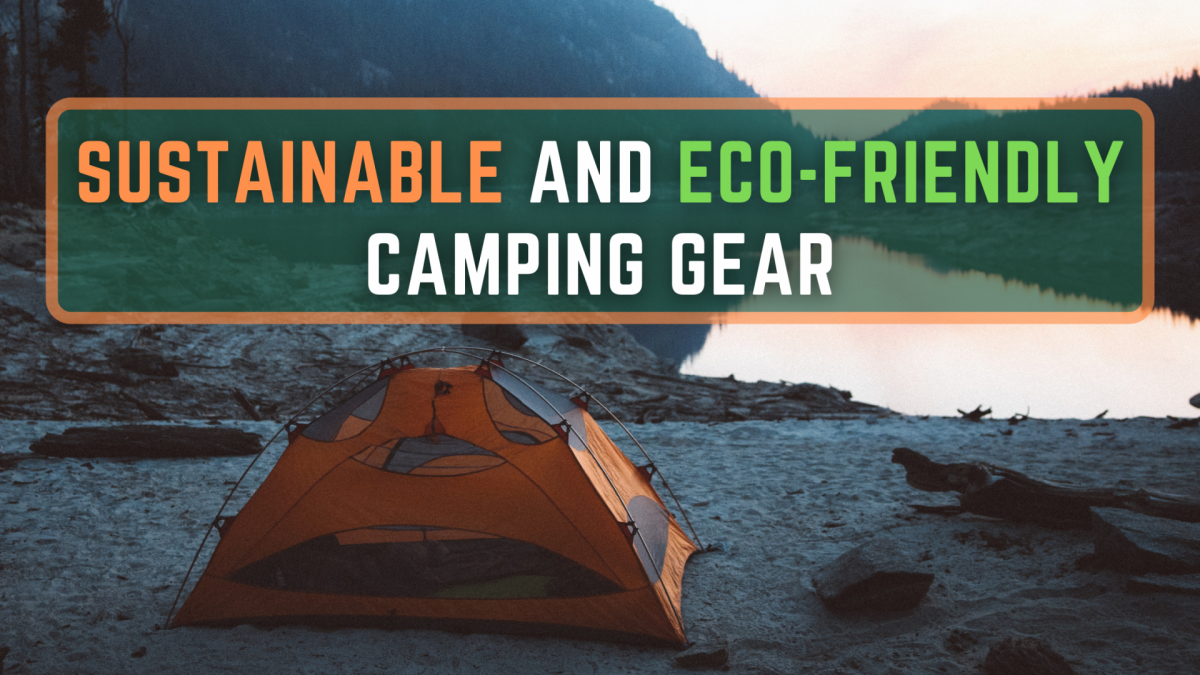
Nature-Friendly Gear: How to Camp Sustainably
Nature-Friendly Gear: How to Camp Sustainably
When it comes to camping, remember the age-old saying: ‘Take only pictures, leave only footprints.’ In today’s world, it’s more important than ever to be mindful of our impact on nature. That’s why choosing nature-friendly gear is crucial.
In this guide, you’ll learn how to camp sustainably by making conscious choices for your camping equipment. From eco-friendly tents to sustainable sleeping gear, we’ll help you make the right choices to minimize your environmental footprint.
We’ll also explore eco-friendly cooking equipment, biodegradable toiletries, responsible water usage, and proper waste disposal. By following these tips, you can enjoy the great outdoors while preserving it for future generations.
So let’s get started on your journey to becoming a nature-friendly camper!
Choosing the Right Eco-Friendly Tent
When choosing an eco-friendly tent for your camping trip, consider using a lightweight, recycled material that minimizes environmental impact. Opting for a tent made from recycled materials not only reduces waste but also helps conserve valuable resources. Look for tents that are constructed from recycled polyester or nylon fabrics, as these materials have a lower carbon footprint compared to their virgin counterparts. Additionally, lightweight tents aren’t only easier to carry, but they also require less energy to produce and transport. This means that by choosing a lightweight tent, you aren’t only reducing your carbon footprint but also minimizing the overall environmental impact of your camping trip.
Furthermore, it’s important to consider the durability of the tent. A durable tent will have a longer lifespan, reducing the need for replacements and ultimately reducing waste. Look for tents that are designed to withstand harsh weather conditions and are made with reinforced seams and high-quality zippers. Additionally, consider whether the tent comes with a repair kit, as this can further extend its lifespan and reduce waste.
Lastly, consider the overall eco-friendliness of the tent brand. Research the company’s sustainability practices, such as their use of renewable energy, recycling programs, and commitment to minimizing waste. By choosing a tent from a brand that prioritizes sustainability, you’re supporting companies that are actively working towards reducing their environmental impact.
Sustainable Sleeping Gear Options
To ensure a sustainable camping experience, consider investing in sustainable sleeping gear options to complement your eco-friendly tent choice.
When it comes to sleeping gear, there are several eco-friendly options available that can help reduce your environmental impact while providing comfort and insulation.
One sustainable sleeping gear option is a sleeping bag made from recycled materials. These sleeping bags are often made from recycled polyester, which reduces the amount of waste going to landfills and decreases the demand for new materials. Look for sleeping bags that are also free from harmful chemicals and dyes to further minimize their environmental impact.
Another sustainable option is a sleeping pad made from natural or recycled materials. Natural materials like cork or wool are renewable and biodegradable, making them a great choice for eco-conscious campers. Recycled materials like foam or rubber can also provide insulation and comfort while reducing waste.
Additionally, consider using organic or natural fiber sheets and blankets for your bedding. These materials are made without the use of harmful chemicals or pesticides, making them a healthier and more sustainable choice. Look for options made from organic cotton, bamboo, or hemp, as these materials have a lower environmental impact compared to conventional cotton.
Eco-Friendly Cooking Equipment and Utensils
Looking to cook sustainably while camping? Choosing eco-friendly cooking equipment and utensils is a great way to minimize your environmental impact and enjoy nature responsibly.
When it comes to pots and pans, opt for those made from stainless steel or cast iron, as they’re durable and can withstand high heat. These materials also distribute heat evenly, allowing for efficient cooking. Avoid non-stick cookware, as the non-stick coating can release harmful chemicals when heated. Instead, use a bit of oil or butter to prevent food from sticking to the pan.
For utensils, consider using reusable options made from bamboo or stainless steel. These materials are lightweight, durable, and can be easily cleaned. Avoid disposable plastic utensils, as they contribute to landfill waste. Additionally, bring along reusable plates, bowls, and cups instead of single-use alternatives.
When it comes to fuel, choose eco-friendly options like propane or butane, which burn cleaner and produce fewer emissions compared to other fuels. If you prefer cooking over an open fire, gather fallen branches and twigs instead of purchasing firewood. This helps to minimize deforestation and reduce the impact on the local ecosystem.
Minimizing Waste With Biodegradable Toiletries
Choose biodegradable toiletries to minimize waste while camping.
When it comes to preserving the environment, every small action counts. By opting for biodegradable toiletries, you can significantly reduce your ecological footprint while enjoying the great outdoors.
Traditional toiletries often contain harmful chemicals that can harm wildlife and pollute water sources. However, biodegradable alternatives are made from natural ingredients that can break down and decompose over time, leaving minimal impact on the environment.
Look for biodegradable options for essentials such as soap, shampoo, toothpaste, and sunscreen. These products are designed to dissolve and disintegrate naturally, ensuring that they don’t leave behind harmful residues that can harm ecosystems.
Additionally, consider packing reusable containers for your toiletries, such as refillable bottles and bars of soap. This way, you can further minimize waste and reduce the need for single-use plastics.
Responsible Water Usage and Filtration Methods
Make sure you’re using water responsibly and employing effective filtration methods while camping. Water is a precious resource, especially in natural environments where access to clean water may be limited. To minimize your impact, start by using water sparingly. Instead of leaving the tap running while brushing your teeth or washing dishes, turn it off when not in use. Consider using biodegradable soap to minimize any harm to the surrounding environment.
When it comes to filtration methods, there are a few options to consider. One of the most common methods is using water purification tablets or drops. These can be easily carried in your backpack and are effective at killing bacteria and viruses in the water. Another option is a portable water filter, which allows you to filter water directly from the source. These filters typically use a combination of carbon and ceramic filters to remove impurities.
Remember to always follow the guidelines and regulations set by the local authorities or park management regarding water sources. Some areas may prohibit drawing water from certain sources to protect the ecosystem. By being mindful of your water usage and employing effective filtration methods, you can ensure a sustainable camping experience while preserving the natural beauty of the environment.
Leave No Trace: Packing Out and Proper Waste Disposal
How can you effectively pack out and dispose of waste while camping to minimize your impact on the environment?
When it comes to waste disposal, the golden rule is to leave no trace. This means that you should pack out everything you bring in, including all your trash and waste. Carry a designated trash bag with you and make sure to seal it properly to prevent any leakage or odor. Remember to never bury your trash or leave it behind, as it can harm wildlife and disrupt the natural ecosystem.
In terms of human waste, it’s crucial to follow the proper procedures. If there are no restroom facilities available, make use of a portable toilet or a bag specifically designed for waste disposal. These bags are typically lined with chemicals that break down the waste and neutralize odors. Once you have used the bag, seal it securely and pack it out with your other trash.
It is also important to be mindful of where you dispose of your waste. Choose a location that’s at least 200 feet away from any water sources, such as rivers or lakes, to prevent contamination. Additionally, never dispose of any waste in or near a campfire, as it can release harmful chemicals into the air.
Frequently Asked Questions
What Are Some Tips for Camping Sustainably With Pets?
When camping with pets, it’s important to be mindful of their impact on the environment. Always clean up after them, use eco-friendly pet gear, and keep them on a leash to minimize disturbances to wildlife.
Are There Any Eco-Friendly Options for Camping Chairs and Tables?
Yes, there are eco-friendly options for camping chairs and tables. Look for chairs made from recycled materials or sustainably sourced wood. Tables made from bamboo or recycled plastic are also great choices.
How Can I Minimize My Environmental Impact While Camping in a Popular Tourist Destination?
To minimize your environmental impact while camping in a popular tourist destination, you can follow a few simple steps. Use nature-friendly gear, pack out your trash, respect wildlife, and leave the area as you found it.
What Are the Best Ways to Pack and Transport Food to Minimize Waste and Reduce Plastic Use?
To minimize waste and reduce plastic use while packing and transporting food, focus on using reusable containers, opting for bulk items, and avoiding single-use plastic packaging. This will have a positive impact on the environment.
Are There Any Sustainable Options for Camping Stoves and Fuel?
Are there any sustainable options for camping stoves and fuel? Yes, there are! You can choose wood-burning stoves or solar-powered stoves for a more eco-friendly camping experience.
Conclusion
So next time you head out on a camping trip, remember to choose eco-friendly gear. From your tent to your sleeping gear and cooking equipment, there are sustainable options available.
Minimize waste by using biodegradable toiletries and practice responsible water usage. And don’t forget to leave no trace by packing out and properly disposing of your waste.
By making these small changes, we can all contribute to a more nature-friendly camping experience. this link
Happy camping!


Welcome to my website! My name is Nathan Rusconi, and I am a professional Luxury Camping Gear Designer. With a passion for the great outdoors and a keen eye for design, I have dedicated my career to creating exceptional products that enhance the camping experience.
